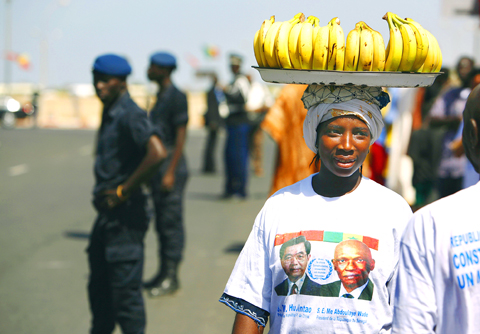China and Senegal signed five trade pacts on Friday as Chinese President Hu Jintao (胡錦濤) pressed on with an African tour to boost commercial ties and deflect criticism that Beijing exploits the world’s poorest continent.
According to the Senegalese presidency, the two sides inked a deal to set up a joint body to deepen economic, commercial and technological cooperation.
Under another pact, China extended loans for new buses. A third agreement was a contract for China to buy peanut oil, the presidency said, but did not say how much the deals were worth.

PHOTO: AP
Neither Hu nor Senegalese President Abdoulaye Wade spoke with reporters and no press conferences are planned during the visit.
Earlier on Friday, Hu spoke in Mali of the need for China to strengthen relations with Africa during this time of economic crisis.
“We are both developing countries facing the international economic crisis, we should strengthen our relationship. China will continue its aid to Mali,” he said at a foundation stone ceremony for a bridge on the River Niger in Bamako.
China is criticized in the West over its drive to secure natural resources from African states, including from regimes spurned by the West, and Hu has been anxious on his trip to push forward talk of investment and debt-relief.
China’s economy has boomed over recent years, driving oil and other commodity prices to record highs in a scramble for raw materials. The African continent has become a key focus in its efforts to secure supplies.
Beijing is often accused of giving little in return and Hu’s trip to four less resource-rich African nations — Mali, Senegal, Tanzania and Mauritius — has been seen as a move to counter such claims.
Official Chinese figures show trade between China and Africa jumped 45 percent last year, with Chinese exports to the continent up 36.3 percent and its imports, mainly oil, soaring 54 percent.
Western critics of China’s growing role in Africa accuse Beijing of acting in a colonial fashion, focusing only on its own interests, and dealing with outcast regimes such as in Sudan.
Beijing has strongly rejected such criticism, insisting that its involvement is even-handed and of mutual benefit to it and its African partners.
Although relatively small, Mali and Senegal still have significant resources.
Dakar and Beijing re-established diplomatic ties in 2005 after a 10-year hiatus over Senegal’s recognition of Taiwan. Hu’s visit is widely seen as a reward to Dakar for returning to the fold of its “one China” policy.
Hu was to meet senior Senegalese politicians yesterday morning before visiting the site of a new national theater being built with Chinese aid and going on to Tanzania. He will wrap up his tour in Mauritius.

POLITICAL PRISONERS VS DEPORTEES: Venezuela’s prosecutor’s office slammed the call by El Salvador’s leader, accusing him of crimes against humanity Salvadoran President Nayib Bukele on Sunday proposed carrying out a prisoner swap with Venezuela, suggesting he would exchange Venezuelan deportees from the US his government has kept imprisoned for what he called “political prisoners” in Venezuela. In a post on X, directed at Venezuelan President Nicolas Maduro, Bukele listed off a number of family members of high-level opposition figures in Venezuela, journalists and activists detained during the South American government’s electoral crackdown last year. “The only reason they are imprisoned is for having opposed you and your electoral fraud,” he wrote to Maduro. “However, I want to propose a humanitarian agreement that

ECONOMIC WORRIES: The ruling PAP faces voters amid concerns that the city-state faces the possibility of a recession and job losses amid Washington’s tariffs Singapore yesterday finalized contestants for its general election on Saturday next week, with the ruling People’s Action Party (PAP) fielding 32 new candidates in the biggest refresh of the party that has ruled the city-state since independence in 1965. The move follows a pledge by Singaporean Prime Minister Lawrence Wong (黃循財), who took office last year and assumed the PAP leadership, to “bring in new blood, new ideas and new energy” to steer the country of 6 million people. His latest shake-up beats that of predecessors Lee Hsien Loong (李顯龍) and Goh Chok Tong (吳作棟), who replaced 24 and 11 politicians respectively

Young women standing idly around a park in Tokyo’s west suggest that a giant statue of Godzilla is not the only attraction for a record number of foreign tourists. Their faces lit by the cold glow of their phones, the women lining Okubo Park are evidence that sex tourism has developed as a dark flipside to the bustling Kabukicho nightlife district. Increasing numbers of foreign men are flocking to the area after seeing videos on social media. One of the women said that the area near Kabukicho, where Godzilla rumbles and belches smoke atop a cinema, has become a “real

‘WATER WARFARE’: A Pakistani official called India’s suspension of a 65-year-old treaty on the sharing of waters from the Indus River ‘a cowardly, illegal move’ Pakistan yesterday canceled visas for Indian nationals, closed its airspace for all Indian-owned or operated airlines, and suspended all trade with India, including to and from any third country. The retaliatory measures follow India’s decision to suspend visas for Pakistani nationals in the aftermath of a deadly attack by shooters in Kashmir that killed 26 people, mostly tourists. The rare attack on civilians shocked and outraged India and prompted calls for action against their country’s archenemy, Pakistan. New Delhi did not publicly produce evidence connecting the attack to its neighbor, but said it had “cross-border” links to Pakistan. Pakistan denied any connection to